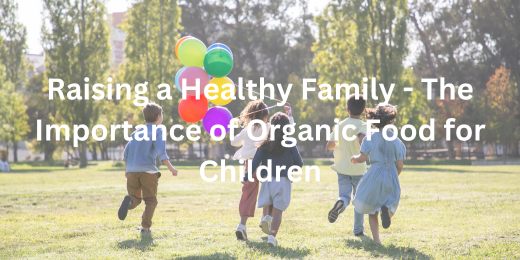
Raising a Healthy Family – The Importance of Organic Food for Children
Organic food for kids
Introduction to Organic Food for Kids
Organic food for kids holds significant importance in promoting their overall health and well-being. Organic food is produced using organic farming methods, which exclude synthetic pesticides, fertilisers, and genetically modified organisms. As awareness about the benefits of organic food for children grows, more families are choosing organic options to ensure the safety and purity of their children’s diet.
Organic farming methods prioritise environmental sustainability and soil health, promoting biodiversity and natural ecosystems. This approach not only benefits the environment but also produces food that is free from harmful chemicals and additives. With the rising concerns about food safety and quality, the demand for organic food for kids is steadily increasing, driving the growth of the organic food market.
As parents become more informed about the benefits of organic food for children, they are making conscious choices to provide the best nutrition for their families. By opting for organic options, they can minimise exposure to harmful substances and support sustainable agricultural practices. With a focus on health, sustainability, and ethical food production, organic food is becoming the preferred choice for families seeking wholesome and nutritious meals for their children.
Nutritional Benefits of Organic Food for Kids
Organic food for kids offers numerous nutritional benefits that contribute to their overall health and development. Compared to conventionally grown produce, organic fruits and vegetables typically have a higher nutrient content, including vitamins, minerals, and antioxidants. This means children can receive more essential nutrients from their food, supporting their growth and immune function.
Additionally, organic food is grown without the use of synthetic pesticides and fertilisers, resulting in lower pesticide exposure for children. Pesticides have been linked to various health concerns, including developmental issues and hormone disruption. By choosing organic options, parents can reduce their children’s exposure to harmful chemicals and promote a safer food environment.
Furthermore, organic food is often praised for its enhanced flavour and taste. Because organic crops are grown in nutrient-rich soil and allowed to ripen naturally, they tend to have a fuller, more robust flavour compared to conventionally grown counterparts. This can encourage children to enjoy a wider variety of fruits, vegetables, and other organic foods, fostering healthy eating habits from a young age.
Impact on Children’s Health
Organic food for kids has a significant impact on their health and well-being, offering a range of benefits that support their overall development. One notable advantage is the reduced risk of allergies and sensitivities associated with organic produce. By avoiding synthetic pesticides and additives, organic food helps minimise potential allergens, promoting a healthier immune system in children.
Furthermore, organic food provides essential nutrients that are crucial for healthy growth and development in children. Nutrient-rich organic fruits, vegetables, and whole grains support the development of strong bones, muscles, and organs, laying the foundation for optimal growth. Additionally, organic dairy and meat products offer high-quality protein and essential vitamins for overall health and vitality.
Organic food helps youngsters digest and absorb nutrients more effectively. Because there are no toxic chemicals, it is gentler on their stomachs, decreasing discomfort and promoting regular bowel movements. This ensures that they receive all the nutrients they require for optimal health.

Environmental Sustainability
Organic food for kids not only benefits children’s health but also contributes to environmental sustainability. Organic farming methods prioritise the preservation of soil health by avoiding the use of synthetic fertilisers and pesticides, which can degrade soil quality over time. This helps maintain fertile soil for future generations.
Additionally, organic agriculture promotes the conservation of water resources by implementing water-efficient practices such as crop rotation and mulching. By reducing water wastage and minimising pollution from agricultural runoff, organic farming helps protect freshwater ecosystems and ensures sustainable water management for communities.
Organic farming reduces chemical contamination by avoiding synthetic pesticides and herbicides. This prevents toxins from entering the soil, water, and air, safeguarding ecosystems and benefiting animals and human health. Choosing organic food promotes environmentally friendly farming and makes the world healthier for the future.
Practical Tips for Incorporating Organic Food
Incorporating organic food for kids into your family’s diet can be easier than you think with these practical tips. Start by shopping at local organic markets to access a variety of fresh, organic produce. Visit your local Uyir Organic Farmers Market to buy the best organic products. Additionally, you can purchase them online at www.uyirorganic.farm or www.uyironline.in.
Consider growing your own organic produce in a backyard garden or on a windowsill. This allows you to have full control over the growing process and ensures the freshness and quality of the food you provide for your children. Plus, involving children in gardening can be a fun and educational experience for the whole family.
When purchasing packaged organic products, be sure to read labels and certifications carefully. Look for reputable organic certifications such as USDA Organic or Soil Association Organic or India Organic to ensure that the product meets strict organic standards. This helps you make informed choices and select the best organic options for your children’s health and well-being.
Conclusion: Prioritising Organic Food for a Healthy Future
Prioritising organic food for kids is key to ensuring a healthy future for our children. The benefits of organic food for children extend beyond immediate nutrition to long-term health outcomes. By choosing organic options, parents can support their children’s overall well-being and development.
Moreover, opting for organic food demonstrates a commitment to sustainable farming practices. Organic farming methods promote environmental stewardship, biodiversity conservation, and soil health preservation. By supporting organic agriculture, families contribute to a more sustainable food system for future generations.
In conclusion, prioritising organic food empowers families to make informed food choices that benefit both their children’s health and the planet. By embracing organic options and supporting sustainable farming practices, we can create a healthier and more sustainable future for our children and generations to come.